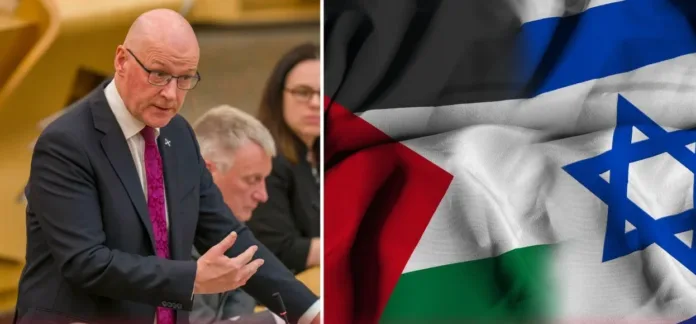Scottish Government cuts arms funding to Israel, flies flag, and urges UK to act
The Scottish Government has halted public funding to arms companies supplying Israel and raised the Palestinian flag above its buildings in Edinburgh, as First Minister John Swinney denounced Israel’s actions in Gaza as constituting “genocide”.
Addressing the Scottish Parliament, Swinney unveiled a series of measures he said were a moral and political response to the “unacceptable” humanitarian catastrophe in Gaza. He confirmed that no new awards of public money will be made to arms firms whose products or services are used by the Israeli military.
This suspension includes grants normally channelled through Scottish Enterprise and the Scottish National Investment Bank, much of which traditionally supports apprenticeships within arms companies. The First Minister argued that it is unacceptable for taxpayers’ money to subsidise firms linked to a state accused of committing atrocities.
“We will pause new awards of public money to arms companies whose products or services are provided to countries where there is plausible evidence of genocide being committed by that country – that will include Israel,” Swinney told MSPs. “No public monies should go to arms companies involved with the Israeli military.”
At St Andrew’s House and Victoria Quay, the Palestinian flag was raised in a symbolic gesture of solidarity. Swinney also called on the UK Government to recognise Palestine as a state without delay and to withdraw from the UK–Israel free trade agreement.
The announcement has provoked sharp debate across Holyrood. Scottish Conservative leader Russell Findlay acknowledged the Middle East conflict as a “blight on humanity” but insisted Holyrood should keep its focus on using devolved powers “to improve people’s lives here in Scotland”.
Scottish Labour leader Anas Sarwar described the crisis in Gaza as “beyond intolerable” and went further, declaring Israeli Prime Minister Benjamin Netanyahu a “war criminal”. His statement underscored the growing pressure on governments across the UK to take a firmer stance.
Scottish Green co-leader Ross Greer welcomed Swinney’s move but argued it did not go far enough. He urged the First Minister to press for a full boycott of Israel by all Scottish businesses. Swinney declined, saying the government had to act strictly within its devolved powers.
Scottish Liberal Democrat leader Alex Cole-Hamilton added his voice, urging both the Scottish and UK Governments to intensify their actions. “The images of the children of Gaza should deserve to haunt us for 100 years,” he warned. He pressed Swinney on whether more than the previously announced 20 children could be brought to Scotland for urgent medical treatment.
In reply, the First Minister stressed Scotland’s willingness to assist. “We are willing to be as helpful as we can to as many families as we can,” he said, promising further engagement on humanitarian support.
The Scottish Government has faced criticism in the past for supporting arms companies through grants and apprenticeship schemes, despite opposition from campaigners. Wednesday’s statement marks the clearest break yet from those practices, aligning Holyrood with calls for accountability over the conduct of Israel’s military campaign.
Swinney emphasised that his government continues to work on domestic priorities and rejected accusations of distraction. He pointed to parliamentary debates earlier in the week on Scottish issues, underlining that ministers are capable of addressing both international crises and national concerns simultaneously.
With Palestinian flags flying over Edinburgh and funding streams frozen, Scotland’s intervention adds fresh political weight to the growing international outcry over Gaza. Whether Westminster responds to Holyrood’s call for recognition of Palestine remains to be seen, but the message from Scotland was unambiguous: no public money should flow to companies tied to alleged war crimes
